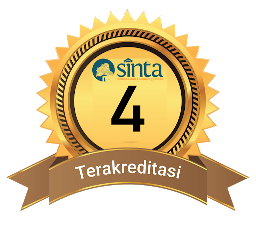E-Module Development Project To Strengthen Pancasila Student Profiles On The Themed Sustainable Lifestyle
Published:
2024-12-12Issue:
Vol. 7 No. 2 (2024): Edisi NovemberKeywords:
E-Module, Pancasila Student Profile, Sustaniable LifestyleArticles
Downloads
How to Cite
Abstract
This research is a research and development e-module project to strengthen the profile of Pancasila students with the theme of a sustainable lifestyle. This research was carried out from March to July 2024 at SMA Negeri 1 Bengkulu City, with research subjects namely 31 class XA students. This research aims to determine the level of feasibility of e-modules and student responses to e-modules. This development uses a 4-D development model (define, design, development, and disseminate) which is limited to the development stage. The instruments in this research were interview sheets, student needs questionnaires, validation sheets, and student response questionnaires. From the research results it is known that (1) the feasibility level of the e-module has a very feasible category with a score of 93.8%, (2) the results of the student response test to the e-module received a score of 88.1% with a very good category. The e-module developed is equipped with explanations, images and videos which can be accessed using a smartphone connected to the internet network.
Keywords: E-module, Pancasila Student Profile, Sustainable Lifestyle
References
Aviatin, A. A., Dhea, A. P., Fatmawati, F. R., Marlina S., dan Anisa U. S. (2023). Impleentasi Pembelajaran Berdiferensiasi Dengan Model Project Based Learning Pada Peserta Didik Sekolah Menengah Atas Kelas X Pada Materi Bioteknologi. Jurnal Pendidikan Sejarah dan Riset Sosial Humaniora, 3(3):, 251-258.
Dwiningsih, Kusumawati., Sukarmin., Muchlis., dan P. T. R. (2018). Pengembangan Media Pembelajaran Kimia Menggunakan Media Laboratorium Virtual Berdasarkan Paradigma Pembelajaran Di Era Global. Jurnal Teknologi Pendidikan, 06(2622–4283), 156–176.
Erdi, P. N. dan T. R. P. (2022). Penggunaan E-Modul Dengan Sistem Project Based Learning. Jurnal Vokasi Informatika (JAVIT), 1(1), 23–27.
Evitasari, A. D. (2018). Self-Sufficiency Optimization of Students Learning through Module. In Social, Humanities, and Educational Studies (SHES): Conference Series, 1(2), 67-74.
Handayani, D., & Nurhamidah, N. (2024). The Development of Student Soft Skills through the Integration of PJBL STEAM Learning in The Organic Chemistry 1 Topic of Hydrocarbons. Jurnal Pendidikan Kimia Indonesia, 8(1), 29-38.
Hariono, I., Wiryokusumo, I., & Fathirul, A. N. (2021). Pengembangan Instrumen Penilaian Kognitif Berbasis Google Form Pelajaran Matematika. Edcomtech: Jurnal Kajian Teknologi Pendidikan, 6(1), 57-68
Haryanto, B. T. (2023, December). Implementasi Projek Penguatan Profil Pelajar Pancasila Pada Dimensi Kreatif Di SMPN 34 Semarang. In Seminar Nasional Keindonesiaan (FPIPSKR), 8(1), 967-978.
Hattarina, S., Saila, N., Faradilla, A., Putri, D. R., & Putri, R. G. A. (2022, August). Implementasi Kurikulum Medeka Belajar Di Lembaga Pendidikan. In Seminar Nasional Sosial, Sains, Pendidikan, Humaniora (SENASSDRA), 1(1), 181-192.
Irawati, D., Iqbal, A. M., Hasanah, A., & Arifin, B. S. (2022). Profil pelajar Pancasila sebagai upaya mewujudkan karakter bangsa. Edumaspul: Jurnal Pendidikan, 6(1), 1224-1238.
Kartini, K.S., & Putra, I. N. T. (2020). Respon Siswa Terhadap Pengembangan Media Pembelajaran Interaktif Berbasis Android. Jurnal Pendidikan Kimia Indonesia, 4(1): 12-19.
Kemendikbud. (2022). Kurikulum Merdeka.
Mulyasa, H. E. (2023). Implementasi Kurikulum Merdeka. Bumi Aksara.
Ngurah, S. I. G., Made, A. N., & Luh, S. N. (2022). Projek Penguatan Profil Pelajar Pancasila (P5) Melalui Penciptaan Karya Seni Tari Gulma Penida Pada Kurikulum Merdeka. Geter: Jurnal Seni Drama, Tari dan Musik, 5(2), 25-38.
Saraswati, D. A., Sandrian, D. N., Nazulfah, I., Abida, N. T., Azmina, N., Indriyani, R., Suryaningsih, S., USMA Negeri, & Lestari, I. D. (2022). Analisis Kegiatan P5 di SMA Negeri 4 Kota Tangerang sebagai Penerapan Pembelajaran Terdiferensiasi pada Kurikulum Merdeka. Jurnal Pendidikan Mipa, 12(2): 185–191.
Satria, R., Pia Adiprima., Kandi Sekar Wulan., dan Tracey Yani Harjatanaya. (2022). Panduan Pengembangan Proyek Penguatan Profil Pelajar Pancasila. Badan Standar, Kurikulum, dan Asesmen Pendidikan.
Solikhah, N., & Wahyuni, A. (2023). Analisis Problematika Implementasi Kurikulum Merdeka Belajar di Sekolah Dasar. Pendas: Jurnal Ilmiah Pendidikan Dasar, 8(2), 4625-4640.
Sugiyono. (2015). Metode Penelitian Pendidikan. Bandung: Alfabeta
Sugiyono. (2017). Metode Penelitian dan Pengembangan, Cet ke 2. Bandung : Alfabeta.
Susilawati, W. O., Anggrayni, M., & Kustina, K. (2023). Pengembangan Modul P5 (Proyek Penguatan Profil Pelajar Pancasila) Fase B Tema Kewirausahaan Di Sekolah Dasar. Innovative: Journal Of Social Science Research, 3(2), 9799-9812.
Windayanti, W., Afnanda, M., Agustina, R., Kase, E. B., Safar, M., & Mokodenseho, S. (2023). Problematika guru dalam menerapkan kurikulum merdeka. Journal on Education, 6(1), 2056-2063.
Zhafirah, T., Erna, M., & Rery, R. U. (2020). Development of E-Module Based on Problem Based Learning (Pbl) in Hydrocarbon Material. Al-Ishlah: Jurnal Pendidikan, 12(2), 216-229.
Author Biography
Aurelia Ratih Puspariyani, Universitas Bengkulu
License
Copyright (c) 2024 Aurelia Ratih Puspariyani, Dewi Handayani, Hermasyah Amir

This work is licensed under a Creative Commons Attribution-ShareAlike 4.0 International License.
Authors who publish with Chemistry Education Practice agree to the following terms:
- Authors retain copyright and grant the journal right of first publication with the work simultaneously licensed under a Creative Commons Attribution License 4.0 International License (CC-BY-SA License). This license allows authors to use all articles, data sets, graphics, and appendices in data mining applications, search engines, web sites, blogs, and other platforms by providing an appropriate reference. The journal allows the author(s) to hold the copyright without restrictions and will retain publishing rights without restrictions.
- Authors are able to enter into separate, additional contractual arrangements for the non-exclusive distribution of the journal's published version of the work (e.g., post it to an institutional repository or publish it in a book), with an acknowledgement of its initial publication in Chemistry Education Practice.
- Authors are permitted and encouraged to post their work online (e.g., in institutional repositories or on their website) prior to and during the submission process, as it can lead to productive exchanges, as well as earlier and greater citation of published work (See The Effect of Open Access).






